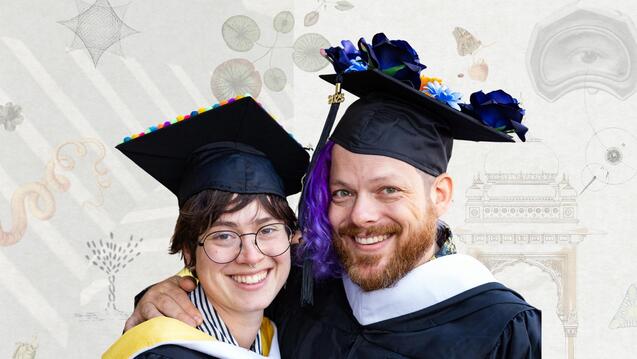
Master of Arts in Transformative Leadership
Develop new ways of being, knowing, relating, and doing in our online master’s in leadership for changemakers and groundbreakers.
Program Overview
Our Approach
Over the course of two years, the Transformative Leadership M.A. program invites students to engage in self-exploration around what matters most to them and how they can draw on all internal and external resources to lead a meaningful and fulfilling life. Our small, intimate classes provide personalized attention and rich interaction with faculty and fellow students. Through rigorous academic study, deep personal inquiry, and a culminating capstone project, the program provides the framework to envision, initiate, and engage in transformative change processes.
Career Paths
Our alumni go on to be passionately engaged in work such as leading a nonprofit, teaching in academia, working for environmental or social justice initiatives, or creating their own consulting firm.
Our graduates apply their knowledge in such fields as:
- Consulting and coaching in various industries
- Leading nonprofit organizations
- Teaching and administrative positions in academia
- Research positions (e.g. think tanks)
- High-tech industries
- Broadcasting
- Municipal government and policy making
ILA Membership
All Transformative Leadership students receive free membership to the International Leadership Association (ILA) while they are in the program. ILA membership includes access to free webinars, podcasts, e-books, articles, and opportunities to collaborate with a global network, as well as discounts to ILA events. The annual ILA conference is the largest leadership conference in the world; faculty, students, and alums sometimes present or lead workshops and students who attend consistently refer to it as an illuminating experience.
Students are encouraged to form a team to compete in the ILA’s annual leadership case study competition, coached by Program Director Jocelyn Chapman. TLD teams have taken first place twice, in 2020 and 2023.
Curriculum
CIIS’ Transformative Leadership master’s program requires attendance at virtual intensives twice per year, at the beginning of the fall and spring semesters.
Throughout the program, students will hone complex and creative ways of being, knowing, relating, and doing. Our unique approach to leadership incorporates a variety of theories, skills, and methods. Some of the interconnected concepts, methods, and approaches you will learn in the program include:
Theory: Participatory Action Research, Cultural Transformation, Systems and Complexity, Cybernetics Transformative Leadership
Skills: Qualitative Research, Psychological Assessments, 360 Feedback, Teamwork and Collaboration, Deep Listening, Futures Thinking
Self-inquiry: Developing a Personal Vision, The Enneagram, Creativity and Imagination, Spirituality and Leadership, The Power of Stories, Addressing Immunity to Change
The M.A. concludes with the opportunity for each student to develop their final Capstone Action Project. We encourage an evolving leadership philosophy to guide the design and implementation of a personally meaningful project: our goal is for students to view this final work as a catalyst for deepening their connection to their current career or creating the path to a new one.
Curriculum Highlights
TLD 6325 The Leadership Experience: Understanding the Will to Lead (3 units) The purpose of this course is to learn to become purpose-centered, internally directed, and other focused. The emphasis is on personal development and increasing your will to lead. By changing your thinking and behavior, you become more able to guide others in changing their thinking and behavior. Therefore, this course is designed to help you learn to better live your values and to more effectively exert transformative influence. The centrality of values to systems thinking and practice will be explored.
TLD 6130 Ways of Relating: Interpersonal Collaboration Skills and Group Dynamics (3 units) This course addresses the fundamental nature of how human beings relate to each other, and how this affects the discourse and practice of leadership and systems change. Students will explore the implications and applications of a plurality of ways of relating. The course focuses on the development of transformative, mutually collaborative capacities in group dynamics and team leadership, and self-understanding in a team context.
TLD 6349 Creating Communities and Coalitions (3 units) Leaders must be able to inspire, influence, and communicate effectively with others to make their vision a reality. This course addresses the role of communities and coalitions in creating change. Topics covered will include the use of language; creating a vision; inspiration, influence, and creativity; communicating effectively; bringing people together; and setting an agenda for change.
-
Semester 1 | Fall
TLD 6001 Online Intensive I (.1 units)
TLD 6125 Leadership: Models, Maps, and Metaphors (3 units)
TLD 6130 Ways of Relating: Interpersonal and Group Dynamics (3 units)
TLD 6300 Ways of Knowing: Systems and Metaphors (3 units)
TLD 6349 Creating Communities and Coalitions (3 units)
TLD 7996 Integrative Seminar (1 unit)
Semester 2 | Spring
TLD 6002 Online Intensive II (.1 units)
TLD 6145 Leadership, Pluralism, and Creativity: Diversity in Action (3 units)
TLD 6325 The Leadership Experience: Understanding the Will to Lead (3 units)
TLD 6635 Transformative Leadership: Leading Ourselves Among Others (3 units)
TLD 7999 Capstone: Action Project (3 units)
TLD 7997 Integrative Seminar (1 unit)
Semester 3 | Summer
Electives - 9 units
TLD 7998 Integrative Seminar (1 unit)
Electives may be taken from both the Transformative Leadership and Transformative Studies programs. Please review the CIIS Academic Catalog for possible electives.
-
Semester 1 | Fall
TLD 6001 Online Intensive I (.1 units)
TLD 6125 Leadership: Models, Maps, and Metaphors (3 units)
TLD 6130 Ways of Relating: Interpersonal and Group Dynamics (3 units)
TLD 6300 Ways of Knowing: Systems and Metaphors (3 units)
TLD 7996 Integrative Seminar (1 unit)
Semester 2 | Spring
TLD 6002 Online Intensive II (.1 units)
TLD 6145 Leadership, Pluralism, and Creativity: Diversity in Action (3 units)
TLD 6325 The Leadership Experience: Understanding the Will to Lead (3 units)
TLD 7997 Integrative Seminar (1 unit)
Semester 3 | Fall
TLD 6003 Online Intensive III (.1 units)
TLD 6349 Creating Communities and Coalitions (3 units)
TLD 6635 Transformative Leadership: Leading Ourselves Among Others (3 units)
TLD 7998 Integrative Seminar (1 unit)
Semester 4 | Spring
TLD 6004 Online Intensive IV (.1 units)
TLD 7999 Capstone: Action Project (3 units)
Electives - 9 units
Electives may be taken from both the Transformative Leadership and Transformative Studies programs. Please review the CIIS Academic Catalog for possible electives.
Creative Futures Focus
The Creative Futures Focus challenges students how to think about compelling futures, envision what better futures might be like, and explore emerging practices that support the creation and embodiment of more desirable personal and collective futures. The focus is an official designation that requires three courses (two mandatory, one selected from a list of electives), and when completed will appear on students' transcripts.
-
Contexts - Understanding the current context, its historical drivers, and how to make sense of them
Concepts - Exploring core theories that inform the focus, and concepts such as progress and utopia
Capacities - Reviewing current limited definitions of human capacities, findings in recent research about expanded human capacities (e.g., transpersonal & positive psychology, wisdom, spiritual traditions), and how they can be applied to creating more desirable futures.
Possibilities - Shedding light on both historical and current, large and small examples of human possibilities (specifically focusing on intercultural, interracial, intergender, international creativity and thriving,) to give a sense what is possible, inspire, show what has been done, what can be done, and what we want and can do more of
Practices - Creating the future requires developing specific practices to develop abilities needed to navigate this age of transformation. The program will focus on exploring well-established as well as leading-edge practices that can facilitate the development of “futures consciousness.”
Focus Learning Outcomes
- Understand the plurality of interpretations of the current condition from multiple sources and traditions, the driving forces, and the effects of expected dystopian futures on most of the population in the U.S. and globally
- Analyze and evaluate concepts used in the discourse of the future, introduce new concepts with a view to application in the development of creative futures
- Develop a grounding in the interrelated theories of creativity, complexity, and synergy as an underlying conceptual framework for thinking about creative futures
- Research, document, contextualize, and provide narratives for examples of creative diversity in a range of contexts, illustrating human possibilities that inspire and counteract limiting assumptions about what is and is not possible
- Demonstrate an understanding of the expanded notion of what it means to be human with a focus on possibilities and capacities found in humanistic, transpersonal, and positive psychology, then study of wisdom, as well as the great spiritual traditions
- Apply relevant practices to support developing and embodying creative futures
-
Three courses total (9 units) are required: TSD 6480, TSD 6485, and an eligible elective.
TSD 6480 Creating the Future: Exploring Human Possibilities
This course serves as an introduction to thinking about and cultivating capacities for the future from the personal to the global. The course will focus on six areas: context, concepts, capacities, possibilities, practices, and integration. The global context situates us in time and space: How we got here and what the key issues are. In order to address a complex and uncertain world, concepts and ways of thinking need to be revised and incorporate systems thinking and complex thought. A reassessment of “human nature” is needed to acknowledge the extended human capacities found in multiple disciplines. While dystopian futures dominate, we will highlight and research human possibilities through the study of inspiring global examples at both micro- and macro-levels. Drawing on a range of traditions, we will learn about practices that support the development of better personal and collective futures. The concept of Transformative Leadership will serve as a framework and as a practice to embody our desired future in this time of transformation.
TSD 6485 Planetary Consciousness and the Future: The interaction of creativity, culture, and diversity and the evolution consciousness
The development of planetary consciousness can give us greater insight into ourselves, our possible identities, how we construct our understanding of the world, and how we interact with others. Students will explore the extent to which their life is already “planetary,” finding examples in, among others, everyday items, language, music, ideas and beliefs, and work. We will begin by excavating our assumptions about, and experience of identity in a global context, apply a systems/complexity view to global and personal interconnectedness, and then look at the creativity of diversity using global examples in the arts, food, and spirituality. You will be asked to research examples of cultural diversity and creativity, culminating in an exploration of your own “planetary consciousness.
Examples of Eligible Elective Courses:
- TSD 6137 Reverse Imagineering: Systems Change for the 21st Century
- TSD 6138 The Art of Transformation: For flourishing and Creative Futures
- TSD 6655 Finding the Extraordinary in the Ordinary: For the Love of All Sentient Beings
- TSD 8014 Creativity and Personal Transformation
- TSD 8421 Ecological and Social Healing: Mindful Awareness and Social
Entry Requirements
Applicants should have a demonstrated capacity to learn and work both independently and collaboratively.
Required Application Materials
Your application is your opportunity to share who you are. To be considered essays and written responses must be your own authentic work.
Online Admissions Application: Begin the application process by submitting an online application and paying the nonrefundable $68 application fee.
Degree Requirement: An undergraduate degree (B.A., B.S., or the equivalent) from an accredited college or university.
Minimum GPA: A GPA of 3.0 or higher in previous coursework is required. However, a GPA below 3.0 does not automatically disqualify an applicant. CIIS will consider a prospective student whose GPA is between 2.0 and 3.0. These individuals are required to submit a GPA Statement and are encouraged to contact Admissions to discuss their options.
Transcripts: Official transcripts from all accredited academic institutions attended where 7 or more credits have been earned. Transcripts may be sent digitally to materials@ciis.edu or mailed to CIIS in their official, sealed envelope. Transcripts from institutions outside the U.S. or Canada require a foreign credit evaluation through World Education Services (WES). CIIS will also accept foreign credential evaluations that are in a comprehensive course-by-course format from the current members of the National Association of Credential Evaluation Services (NACES).
Goal Statement: A one-page (typed, double-spaced) statement of your educational and professional objectives.
Autobiographical Statement: A four-to-six page (typed, double-spaced) a self-reflective autobiographical statement discussing your values and aspirations, and the life experiences that have led to your decision to apply.
Resume
Two Letters of Recommendation: Recommenders should use standard business format and include full contact information: name, email, phone number, and mailing address.
Events and Info Sessions
A Faculty-Led Info Session with Jocelyn Chapman
A Faculty-Led Info Session with Jocelyn Chapman
Attend our in-person event on January 31 or online event on February 21.
An Online Overview with Jennifer Gruczelak and Ronda Sharp


FAQ
-
Transformative Leadership is an asynchronous, conversation-based program meaning that students post comments to one another “anytime, anywhere” within a given time frame. These discussion forums constitute a surprisingly deep and intimate mode of learning because students share their views and challenge one another in respectful ways that foster new understandings for all.
-
No. We are 100% online with optional opportunities for in-person gatherings. Near the beginning of each semester, students participate in zoom intensives that span a few days. These are the only times you are required to participate synchronously. Most courses offer optional zoom meetings which many students appreciate. Opportunities to meet in person are provided through an optional elective each year, university-wide workshops, and particular conferences that some of our students, alums, and faculty attend.
-
The Transformative Leadership M.A. is a two year program.
-
Yes. We have a three-year course sequence plan for students who prefer to take two courses per semester. These students straddle two cohorts.
-
You can learn more about the Transformative Leadership M.A. program by:
- Attending an info session
- Watching videos from our Transformative Inquiry YouTube channel
- Following us on Facebook, Instagram, and LinkedIn
- Talking to current students or alums (for contact info, reach out to our Admissions Counselor, Skylar Hall shall@ciis.edu).
-
- “Stargazing into Your Potential: A Retreat Exploring Transformative Leadership and Archetypal Cosmology Practices”
- “Improvisational Leadership: Flexibility, Creativity, And Whole-Hearted Facilitation”
- “Leadership Development of the Community Advisory Board Through Community-Building, Curiosity, and Connection: a Performance”
- “The Changemaker Collective: A Holistic Wellness Event for Melanated Women Leaders”
-
See our Impact Page.

Take the Next Step
For over 50 years, CIIS has been at the forefront of education that integrates rigorous science, innovative scholarship, and social justice. You will learn from faculty at the forefront of their fields, local artists and activists, and a community of peers as passionate and dedicated as you. There’s never been a better time to be here – let’s build a healthier and more equitable world.




